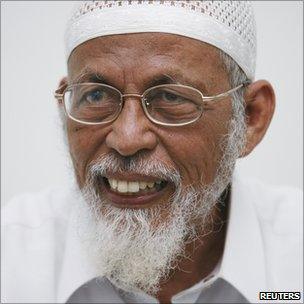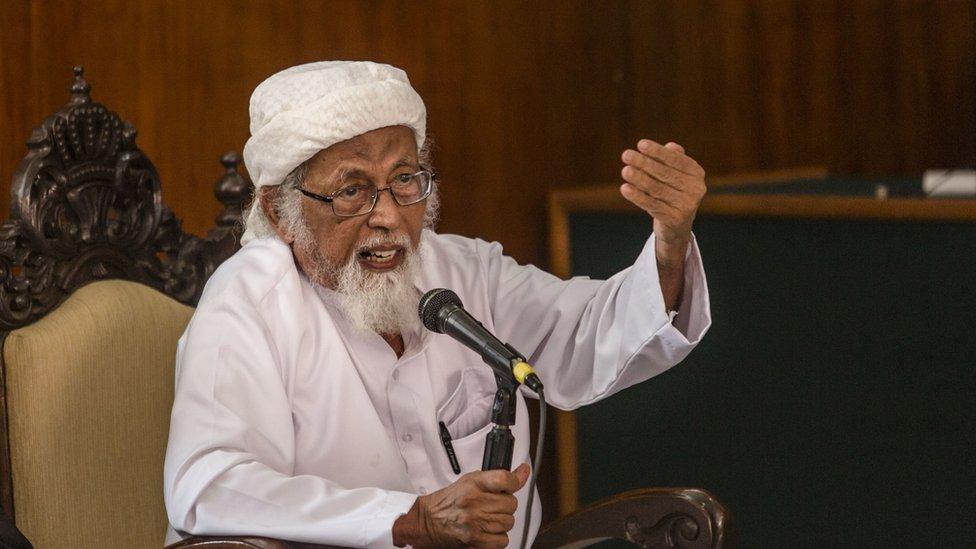Ba'asyir arrest highlights terrorism challenge
- Published

Abu Bakar Ba'asyir founded the hardline Islamist group Jemaah Ansharut Tauhid (JAT) in 2008
Indonesian police have long believed that Abu Bakar Ba'asyir is the spiritual inspiration behind extremist activities in the country - but they have never been able to prove it.
They have come close before though.
Authorities accused Mr Ba'asyir of being the religious head of the militant group Jemaah Islamiah, which was behind the 2002 Bali bombings - but he was released because of a lack of evidence.
Mr Ba'asyir served a jail sentence for what Indonesian judges said was an "evil conspiracy" - inciting violence in the country. His conviction was overturned and he was released in 2006.
Now Indonesian police say they have evidence proving Mr Ba'asyir played an active role in the creation of a new militant group they discovered in Aceh in February.
They say not only did Mr Ba'asyir help to appoint key members to run the militant group's activities, but they believe he also funded its activities.
This is a significant arrest - if the police are able to make the charges they've levelled against Mr Ba'asyir stick. These are very different allegations from what we've seen in previous cases.
In the past, Mr Ba'asyir has been accused of providing the moral and spiritual justification for extremist activities to those who executed them - charges he has consistently denied.
However, analysts believe that Mr Ba'asyir has continued to play a role in violent militant activities in Indonesia since his release from prison.
Brussels-based think tank the International Crisis Group (ICG) alleged in a recently published report that Mr Ba'asyir's new group, Jemaah Ansharut Tauhid (JAT), which he formed in 2008, is an "above ground organisation" with a "dark side".
The ICG said it believed the JAT was supporting violence to achieve its goal of creating an Islamic state in Indonesia.
'Legitimate group'
In May, three members of JAT were arrested on suspicion of raising funds for the Aceh training camp that police claim Mr Ba'asyir has funded and helped to form.
Both Mr Ba'asyir and JAT have denied any links to militancy. JAT has consistently maintained it is a legitimate Islamic group.
The Aceh training camp may hold many clues about the state of terror networks in Indonesia.
When it was first discovered by police in February, security analysts said it showed that there was a possible rejuvenation of terror cells in the country.
If true, this would be potentially troubling news for the Indonesian authorities who have been working to stamp out terror in the country.
Indonesia's anti-terror unit has been under pressure to show results in its efforts to clamp down on militancy ever since the July bombings in 2009, in which seven people were killed.
The blasts came after four years of relative peace and calm in Indonesia, shattering the perception that it had managed to successfully combat home-grown terror.
Mr Ba'asyir's arrest has already been hailed by Australian authorities as another step in the right direction.
But this is just the first stage in the process - under Indonesia's anti-terror laws, police have the right to detain Mr Ba'asyir for seven days for questioning, before they have to formally charge him for this case to go to trial.
While it would be fair to say that most Indonesians associate Mr Ba'asyir with an extremist form of Islam, there are concerns that his arrest may spark a wave of sympathy among those who share his beliefs.
- Published8 January 2021

- Published9 August 2010